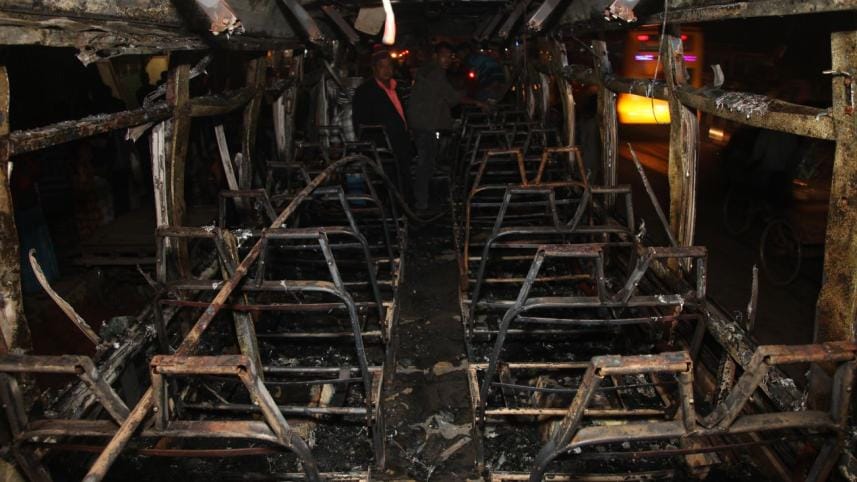Politics of violence: Probable remedy

THE number one priority for any human being is safety of life and property. People live in a society and even form a state basically from that desire. Formation of government and financing of the same are borne by the people with the expectation that they would receive protection.
Citizens have become prey to the violence that has engulfed Bangladesh. It is causing loss of lives and damage to property. There is a prevailing sense of insecurity. The government has so far failed to carry out its prime responsibility of providing safety to the people, who feel that political parties are irresponsible and ineffective, and insensitive to the calamity inflicted on them.
The government is blaming the alliance of political parties opposed to it of masterminding and conducting the hostility. The ruling party and even some government officials are calling those political parties terrorist organisations. The government has been categorically rejecting calls for dialogue.
On the other hand, the opposition alliance has been denying all the allegations. They claim that the violence is being created by government agents to discredit the opposition movement. They are accusing the government of providing the law enforcing agencies a free hand (authority to act beyond their legal jurisdiction) with the task of eliminating their political opponents on false charges. There are media reports hinting at excessive use of force and harassment; arrest and torture in custody; extrajudicial killings, etc., which are being accepted as true by many people.
The root of the conflict lies in the 15th Amendment to the constitution made by the government during its last tenure. The amendment overturned the system of holding of national election, which was previously held under a nonparty caretaker administration, and stated that it would be conducted under the incumbent government. The opposition alliance waged a vigorous movement for undoing of the said amendment as they apprehended manipulation of election results by the party in power. In spite of that, the national election was conducted by the government on January 5, 2014 -- which was boycotted by most of the opposing parties.
That election was considered flawed both inside the country and also by most countries outside. Candidates were declared elected unopposed in more than half of the constituencies. Even where there were election activities, the voter turnout, as reported by locals and independent observers, was negligible. Allegations of irregularities, including rigging and declaring of results on the basis of a prepared list, were heard from candidates and voters.
The opposition parties claim that their concern has been found to be true. They demand restoration of the previous system of nonparty caretaker system and holding of a midterm election.
The government has so far refused to accept the demands or go for any negotiated settlement. It has been resorting to use of force to suppress the movement. It may go up to eliminating the opposition alliance if need be, as stated by some party leaders. The conflict is lingering, resulting in loss of lives and damage to properties. It also has long term adverse consequences for businesses.
It is felt that the government should not underestimate the opposition alliance and its apex party with respect to their organisational capacity and public following. They have alternated with the present government to hold state power during the last 25 years. They never received less than one third of the total votes cast in any election during that period. Restoration of law and order by annihilation of the alliance may not be a viable option. Suppressing the opinion of a considerable section of the population by use of force does not fall under civility or within democratic culture.
The only option left to the government now is to start a dialogue in order to resolve the issues and reach a negotiated agreement. In addition to the above election-related issues other subjects like reform of political culture and government; balancing absolute power of the head of government and party chief; non-use of violence in politics; avoidance of boycott of parliament by opposition, etc. could also be discussed and a consensus could be worked out among all political parties.
There remains a suspicion that political parties, specially the two major ones, may not be able to come to an agreed consensus. In that case, different proposals can be put up to the public for obtaining their opinion through voting. The proposal receiving majority support will have to be accepted by all. Nobody should forget that this country of ours is called "People's Republic of Bangladesh," where all power belongs to the people as per our constitution.
The write is a former minister.




 For all latest news, follow The Daily Star's Google News channel.
For all latest news, follow The Daily Star's Google News channel.
Comments